Research in Biological Sciences
At the nexus of basic science and human health
Our research programs are at the forefront of both basic science and translational research. Research interests span biological scales and systems, from neurodevelopmental brain disorders, to the genetics of aging, to vector ecology, and so much more. Our research is closely integrated with the Medical College of Georgia, allowing our researchers access to additional state-of-the art resources and facilities while fostering collaborations across the university. Check out more about our facilities here.
Join us!
Graduate students: The College of Science and Mathematics has a 2-year, research-based Biomolecular Science MS program, with a cell and molecular biology track. Our graduate faculty also mentor PhD students through the Biomedical Sciences program in the Medical College of Georgia. Those interested in graduate-level research are encouraged to reach out to individual faculty about potential opportunities.
Undergraduate Students: Research in the biological sciences gives students a broader appreciation for their field of study. In the process, students benefit from increased interactions with fellow students and faculty while they gain confidence through hands-on, real-world experiences in the field and in the lab. In addition to the research faculty listed below, several other faculty also take undergraduate students. A complete list of faculty that mentor undergraduate researchers and more information about opportunities can be found here.
The Baltzegar Lab
The Baltzegar Lab studies rapid evolution that occurs in response to human-induced changes to the environment in insect vectors with human-health importance, including mosquitoes in the Aedes genus and the German cockroach, Blattella germanica.
Research Interests: Population Genomics / Vector Biology / Ecology / Insecticide Resistance
The Goldstein Lab
The Goldstein Lab the pathogenesis and repair of diffuse white matter injury – the most common neuropathological outcome of premature birth.
Research Interests: Brain Injury / Myelin / Epigenetics
The Langridge Lab
The Langridge Lab focuses on cell-signaling research, particularly on the Notch receptor. Notch is a receptor used in all multicellular animals for cell fate decisions at numerous stages of development and in many aspects of physiology.
Research Interests: Synthetic Biology / Development / Cell Biology
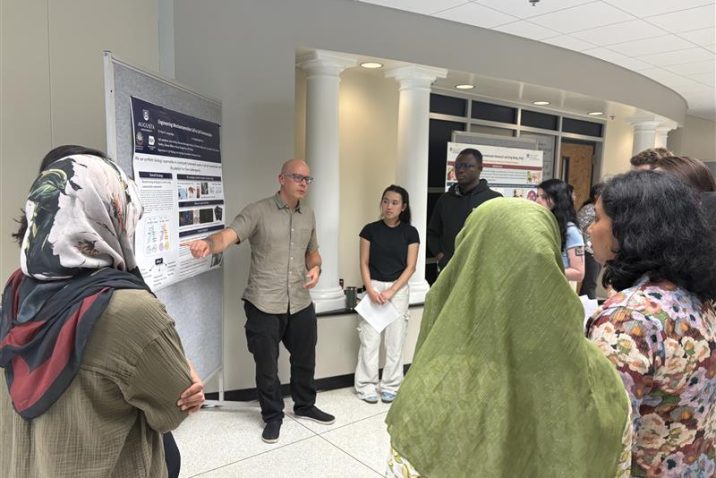
College of Science and Mathematics professor awarded NSF CAREER Award
College of Science and Mathematics professor awarded NSF CAREER Award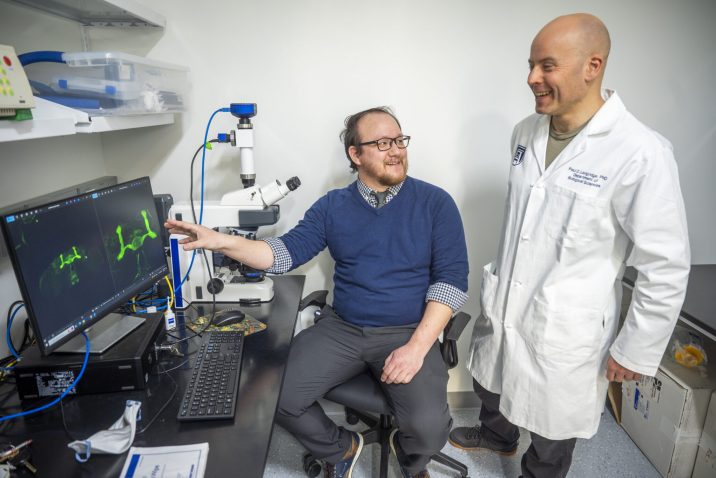
AU researchers studying the way cells talk to unlock new treatments
AU researchers studying the way cells talk to unlock new treatments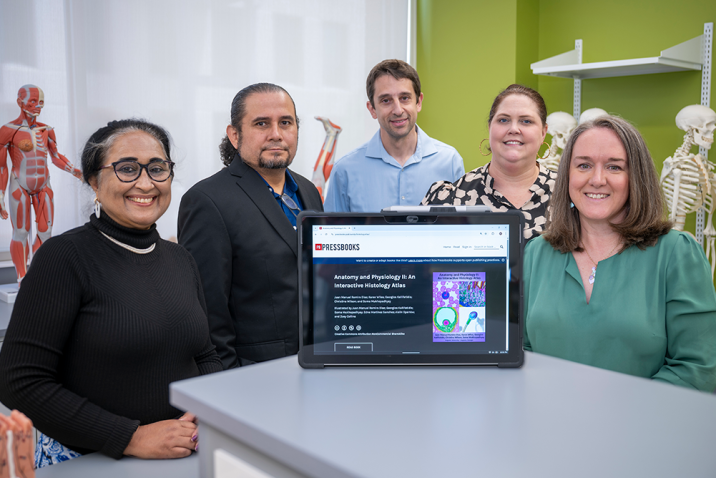
Free, online textbooks created by AU faculty change the game for students
Free, online textbooks created by AU faculty change the game for students
Creativity, Discovery, Engagement
Publications
| Publication |
|---|
Microbiota-derived indole-3-propionic acid extends lifespan in Drosophila and improves muscle and bone health in miceVyavahare, S., Berger, F., Swint, S. G., Mendhe, B., Shukla, M., Duchesne, I., Zhong, R., Cooley, M. A., McGee-Lawrence, M. E., Isales, C. M., Hoffman, J. M. & Fulzele, S., 2026, (Accepted/In press) In: GeroScience.Research output: Contribution to journal › Article › peer-review |
Comparing owner reported and genetic breed identification reveals high concordance in a large cohort from the Dog Aging ProjectDog Aging Project Consortium, Dec 2025, In: Scientific reports. 15, 1, 30493.Research output: Contribution to journal › Article › peer-review |
Ecology of Lake Erie: Causes, consequences and management of eutrophication: A synthesisLudsin, S. A., Munawar, M., Boegehold, A. G., Collingsworth, P. D., Hoffman, J. C. & Murray, M. W., Jun 16 2025, In: Aquatic Ecosystem Health and Management. 28, 1, p. 125-131 7 p.Research output: Contribution to journal › Article › peer-review |
An in vivo screen identifies diverse domains that can act as force-dependent proteolytic switches for Notch activationBaker, F. C., Harman, J., Jordan, T., Walton, B., Ajamu-Johnson, A., Alashqar, R. F., Bhikot, S., Struhl, G. & Langridge, P. D., Jun 10 2025, In: Science Signaling. 18, 890, eadt4606.Research output: Contribution to journal › Article › peer-review |
Food motivation and owner feeding management practices are associated with overweight among Dog Aging Project participantsGartner, K., Hoffman, J. M., McNulty, K. E., Zheng, Z., Ruple, A. & Creevy, K. E., May 2025, In: American Journal of Veterinary Research. 86, 5Research output: Contribution to journal › Article › peer-review |
Sexual dimorphism in the downregulation of extracellular matrix genes contributes to aortic stiffness in female miceKamau, A. N., Sakamuri, A., Okoye, D. O., Sengottaian, D., Cannon, J., Guerrero-Millan, J., Sullivan, J. C., Miller, K. S., Liu, Y. & Ogola, B. O., Mar 2025, In: American Journal of Physiology - Heart and Circulatory Physiology. 328, 3, p. H472-H483Research output: Contribution to journal › Article › peer-review |
Serine metabolism in aging and age-related diseasesShan, S. & Hoffman, J. M., Feb 2025, In: GeroScience. 47, 1, p. 611-630 20 p., e2200130.Research output: Contribution to journal › Review article › peer-review |
Contact area and tissue growth dynamics shape synthetic juxtacrine signaling patternsDawson, J. E., Bryant, A., Walton, B., Bhikot, S., Macon, S., Ajamu-Johnson, A., Jordan, T., Langridge, P. D. & Malmi-Kakkada, A. N., Jan 7 2025, In: Biophysical Journal. 124, 1, p. 93-106 14 p.Research output: Contribution to journal › Article › peer-review |
Demographic features, health status, and behavioral changes associated with cannabidiol use in the Dog Aging ProjectDog Aging Project Consortium, 2025, In: Frontiers in Veterinary Science. 12, 1666663.Research output: Contribution to journal › Article › peer-review |
Empowering learners through student-led integration of environmental health into small group discussionsKoh, E., Kim, J., Aldihri, F., Huang, H., Murray, M., Winston, N. & Watson, C. M., 2025, In: Medical Education Online. 30, 1, 2534054.Research output: Contribution to journal › Article › peer-review |
MyVivarium: A cloud-based lab animal colony management application with realtime ambient sensingVidva, R., Raza, M. A., Prabhakaran, J., Sheikh, A., Sharp, A., Ott, H., Moore, A., Fleisher, C., Netherton, H., Goldstein, E., Pitychoutis, P. M., Nguyen, T. V. & Sathyanesan, A., Jan 2025, In: Computational and Structural Biotechnology Journal. 27, p. 612-623 12 p.Research output: Contribution to journal › Article › peer-review |
Microbiome transplants may not improve health and longevity in Drosophila melanogasterLevine, B. H. & Hoffman, J. M., Jan 2025, In: Biology Open. 14, 1, bio061745.Research output: Contribution to journal › Article › peer-review |
Cross-sectional survey of 43,517 dogs in the Dog Aging Project identifies owner-reported lifetime prevalence and characteristics of gastrointestinal diseaseDog Aging Project Consortium, Dec 2024, In: Journal of the American Veterinary Medical Association. 262, 12Research output: Contribution to journal › Article › peer-review |
The companion dog as a model for inflammaging: a cross-sectional pilot studyDog Aging Project Consortium, Dec 2024, In: GeroScience. 46, 6, p. 5395-5407 13 p.Research output: Contribution to journal › Article › peer-review |
Negative effects of lifespan extending intervention on resilience in miceCorder, K. M., Hoffman, J. M., Sogorovic, A., Yang, Y., Banerjee, A., Sun, Y., Stout, M. B. & Austad, S. N., Nov 2024, In: PloS one. 19, 11 November, e0312440.Research output: Contribution to journal › Article › peer-review |
Clippers are superior to scissors in the collection of hair for chemical analysis in companion dogs: a Dog Aging Project preliminary studyDitzler, B., Evans, J. B., Illing, K., Kaeberlein, M., Promislow, D. E. L., Brindle, E., Hoffman, J. M. & Creevy, K. E., May 2024, In: American Journal of Veterinary Research. 85, 5, p. 1-7 7 p.Research output: Contribution to journal › Article › peer-review |
Analysis of 2,570 responses to Dog Aging Project End of Life Survey demonstrates that euthanasia is associated with cause of death but not ageDog Aging Project Consortium, Feb 2024, In: Journal of the American Veterinary Medical Association. 262, 2, p. 1-10 10 p.Research output: Contribution to journal › Article › peer-review |
Amino acid restriction, aging, and longevity: an updateAustad, S. N., Smith, J. R. & Hoffman, J. M., 2024, In: Frontiers in Aging. 5, 1393216.Research output: Contribution to journal › Review article › peer-review |
THE BENEFITS OF A PHYSICAL THERAPY PROGRAM AMONG BREAST CANCER PATIENTS WHO HAVE UNDERGONE A MASTECTOMYAsbury, E., Bennett, H., Cannon, J. & Kindred, M., 2024, In: Journal of Cancer Rehabilitation. 7, 2, p. 80-92 13 p.Research output: Contribution to journal › Article › peer-review |
Blockade of interleukin-6 trans-signaling prevents mitochondrial dysfunction and cellular senescence in retinal endothelial cellsHoffman, J. M., Robinson, R., Greenway, G., Glass, J., Budkin, S. & Sharma, S., Dec 2023, In: Experimental eye research. 237, 109721.Research output: Contribution to journal › Article › peer-review |
Production of a p65fl/fl/LysMCre mouse model with dysfunctional NF-κB signaling in bone marrow-derived macrophagesKorkaya, A. K., Fischer, J., Peppers, A., Crosson, S. M., Rayamajhi, M., Miao, E. A., Baldwin, A. S. & Bradford, J. W., Nov 2023, In: Innate Immunity. 29, 8, p. 171-185 15 p.Research output: Contribution to journal › Article › peer-review |
Orchiectomy sensitizes cortical bone in male mice to the harmful effects of kynurenineBensreti, H., Yu, K., Alhamad, D. W., Shaver, J., Kaiser, H., Zhong, R., Whichard, W. C., Parker, E., Grater, L., Faith, H., Johnson, M., Cooley, M. A., Fulzele, S., Hill, W. D., Isales, C. M., Hamrick, M. W. & McGee-Lawrence, M. E., Aug 2023, In: Bone. 173, 116811.Research output: Contribution to journal › Article › peer-review |
Assessing tolerability and physiological responses to 17α-estradiol administration in male rhesus macaquesStout, M. B., Vaughan, K. L., Isola, J. V. V., Mann, S. N., Wellman, B., Hoffman, J. M., Porter, H. L., Freeman, W. M. & Mattison, J. A., Aug 2023, In: GeroScience. 45, 4, p. 2337-2349 13 p.Research output: Contribution to journal › Article › peer-review |
Lactating SKH-1 furless mice prioritize own comfort over growth of their pupsHoffman, J. M., Schmitz, B., Pfabe, J. U., Ohrnberger, S. A. & Valencak, T. G., Aug 2023, In: Journal of Comparative Physiology B: Biochemical, Systemic, and Environmental Physiology. 193, 4, p. 453-459 7 p.Research output: Contribution to journal › Article › peer-review |
Gut Microbiome Transplants and Their Health Impacts across SpeciesLevine, B. H. & Hoffman, J. M., Jun 2023, In: Microorganisms. 11, 6, 1488.Research output: Contribution to journal › Review article › peer-review |
Sulforaphane has an additive anticancer effect to FOLFOX in highly metastatic human colon carcinoma cellsČižauskaitė, A., Šimčikas, D., Schultze, D., Kallifatidis, G., Bruns, H., Čekauskas, A., Herr, I., Baušys, A., Strupas, K. & Schemmer, P., Nov 2022, In: Oncology Reports. 48, 5, 205.Research output: Contribution to journal › Article › peer-review |
MicroRNA cargo of extracellular vesicles released by skeletal muscle fibro-adipogenic progenitor cells is significantly altered with disuse atrophy and IL-1b deficiencyParker, E., Mendhe, B., Ruan, L., Marshall, B., Zhi, W., Liu, Y., Fulzele, S., Tang, Y. L., McGee-Lawrence, M., Lee, T. J., Sharma, A. K., Johnson, M., Chen, J. & Hamrick, M. W., Aug 2022, In: Physiological Genomics. 54, 8, p. 296-304 9 p.Research output: Contribution to journal › Article › peer-review |
Development of a novel purification protocol to isolate and identify brain microgliaDoughty, D., Rajpurohit, S. K., Trang, A., Alptekin, A., Korkaya, A. K., Achyut, B. R., Arbab, A. S. & Bradford, J. W., Aug 2022, In: Experimental Biology and Medicine. 247, 16, p. 1433-1446 14 p.Research output: Contribution to journal › Article › peer-review |
The Glucocorticoid Receptor in Osterix-Expressing Cells Regulates Bone Mass, Bone Marrow Adipose Tissue, and Systemic Metabolism in Female Mice During AgingPierce, J. L., Sharma, A. K., Roberts, R. L., Yu, K., Irsik, D. L., Choudhary, V., Dorn, J. S., Bensreti, H., Benson, R. D., Kaiser, H., Khayrullin, A., Davis, C., Wehrle, C. J., Johnson, M. H., Bollag, W. B., Hamrick, M. W., Shi, X., Isales, C. M. & McGee-Lawrence, M. E., Feb 2022, In: Journal of Bone and Mineral Research. 37, 2, p. 285-302 18 p.Research output: Contribution to journal › Article › peer-review |
Long Non-coding RNA MALAT1 Is Depleted With Age in Skeletal Muscle in vivo and MALAT1 Silencing Increases Expression of TGF-β1 in vitroRuan, L., Mendhe, B., Parker, E., Kent, A., Isales, C. M., Hill, W. D., McGee-Lawrence, M., Fulzele, S. & Hamrick, M. W., Jan 21 2022, In: Frontiers in Physiology. 12, 742004.Research output: Contribution to journal › Article › peer-review |
Hindlimb Immobilization Increases IL-1β and Cdkn2a Expression in Skeletal Muscle Fibro-Adipogenic Progenitor Cells: A Link Between Senescence and Muscle Disuse AtrophyParker, E., Khayrullin, A., Kent, A., Mendhe, B., Youssef El Baradie, K. B., Yu, K., Pihkala, J., Liu, Y., McGee-Lawrence, M., Johnson, M., Chen, J. & Hamrick, M., Jan 3 2022, In: Frontiers in Cell and Developmental Biology. 9, 790437.Research output: Contribution to journal › Article › peer-review |
Non-invasive photobiomodulation treatment in an Alzheimer Disease-like transgenic rat modelYang, L., Wu, C., Parker, E., Li, Y., Dong, Y., Tucker, L., Brann, D. W., Lin, H. W. & Zhang, Q., 2022, In: Theranostics. 12, 5, p. 2205-2231 27 p.Research output: Contribution to journal › Article › peer-review |
Absence of MMF1 disrupts heme biosynthesis by targeting Hem1pin Saccharomyces cerevisiaeWhitaker, G. H., Ernst, D. C. & Downs, D. M., Dec 2021, In: Yeast. 38, 12, p. 615-624 10 p.Research output: Contribution to journal › Article › peer-review |
Tachycardia evoked from insular stroke in rats is dependent on glutamatergic neurotransmission in the dorsomedial hypothalamusMarins, F. R., Limborço-Filho, M., Iddings, J. A., Xavier, C. H., Biancardi, V. C., Stern, J. E., Ramiro Diaz, J., Oppenheimer, S. M., Filosa, J. A. & Peliky Fontes, M. A., Nov 2021, In: European Journal of Neurology. 28, 11, p. 3640-3649 10 p.Research output: Contribution to journal › Article › peer-review |
Role of fibro-adipogenic progenitor cells in muscle atrophy and musculoskeletal diseasesParker, E. & Hamrick, M. W., Jun 2021, In: Current Opinion in Pharmacology. 58, p. 1-7 7 p.Research output: Contribution to journal › Review article › peer-review |
Mitochondrial DNA Haplotype Diversity in Two Portunid Populations Found along the Georgia and South Carolina CoastsAbdulovic-Cui, A., Mannix, S., Coleman, A., White, B., Mingledolph, K. & Reichmuth, J. M., May 1 2021, In: Southeastern Naturalist. 20, 2, p. 367-376 10 p.Research output: Contribution to journal › Article › peer-review |
Arrb1 regulates metabolic reprogramming to promote glycolysis in stem cell-like bladder cancer cellsMamouni, K., Kim, J., Lokeshwar, B. L. & Kallifatidis, G., Apr 2 2021, In: Cancers. 13, 8, 1809.Research output: Contribution to journal › Article › peer-review |
Bone Morphogenetic Protein-2 Induces Non-Canonical Inflammatory and Oxidative Pathways in Human Retinal Endothelial CellsAl-Shabrawey, M., Hussein, K., Wang, F., Wan, M., Elmasry, K., Elsherbiny, N., Saleh, H., Yu, P. B., Tawfik, A. & Ibrahim, A. S., Jan 29 2021, In: Frontiers in immunology. 11, 568795.Research output: Contribution to journal › Article › peer-review |
Cyclic Nucleotides as Mediators of Acinar and Ductal FunctionAlbers, T. & Sabbatini, M. E., 2021, Cyclic Nucleotides as Mediators of Acinar and Ductal Function. PancreapediaResearch output: Chapter in Book/Report/Conference proceeding › Chapter (peer-reviewed) › peer-review |
Validation of a Carbohydrate Antigen-19-9 Enzyme-Linked Immunosorbent Assay Kit Using a Mouse Model of Pancreatic CancerMondal, S. & Sabbatini, M., 2021, In: The Arsenal: The Undergraduate Research Journal of Augusta University. 4, 1, p. 27-27 1 p.Research output: Contribution to journal › Article › peer-review |
Research News
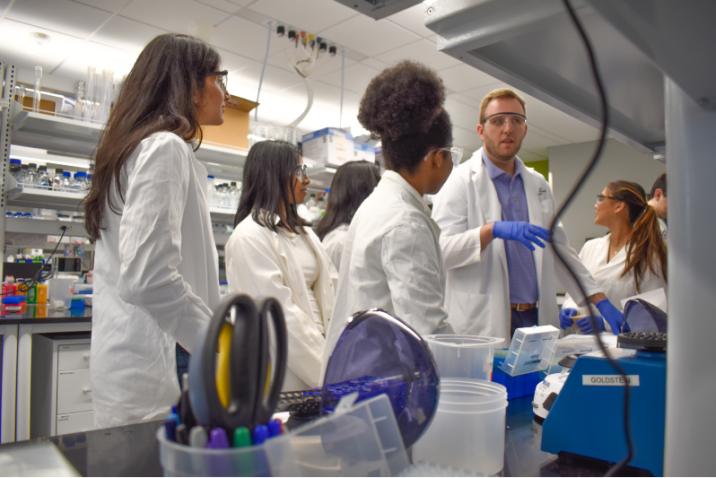
Learners to leaders: Undergraduate research enhances the student experience
Learners to leaders: Undergraduate research enhances the student experience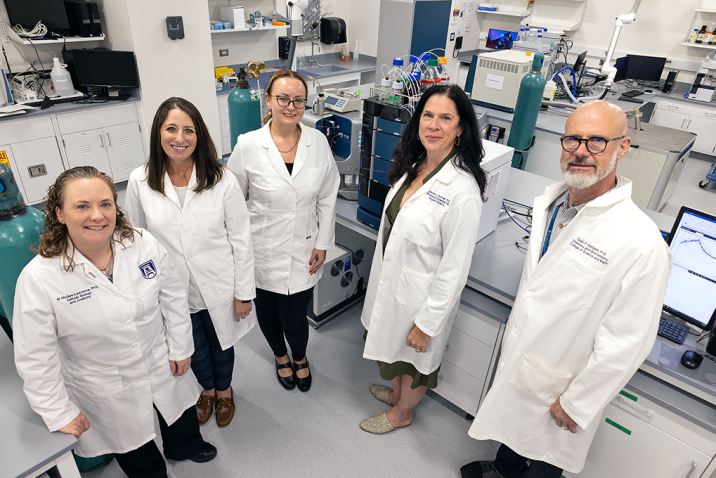
New AU lipidomics group seeks to solve medical condition mysteries
New AU lipidomics group seeks to solve medical condition mysteries
AU researchers studying the way cells talk to unlock new treatments
AU researchers studying the way cells talk to unlock new treatmentsCreating Opportunities
The College of Science and Mathematics provides students with strong foundations in the sciences as well as preparation for careers, citizenship, and a life-long love of learning. We are committed to providing experiences promoting scientific inquiry and discovery and dedicated to creating opportunities for intellectual growth and community involvement.